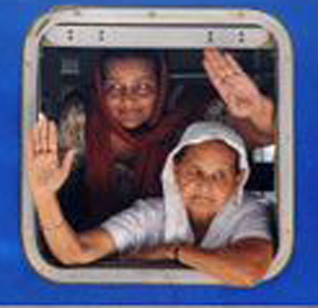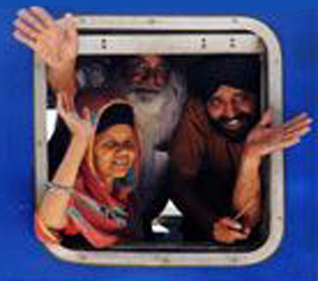Sikhing Answers
How Do You Address Each Of Your Relatives?
Sikhing Answers - XXVI
This is the 26th in our series of questions and answers where we seek your active participation.
A question is posed to you, our readers, inviting you to provide your answers.
That is, each one of you - young and old - is invited to share with us
what YOU believe is the correct answer. There is no presumption of a
right or wrong answer, and nothing is sacrosanct - that is, please feel
free to tell us what you honestly think, believe or conjecture.
Each question will remain open for answers for ONE WEEK at the end of
which, we’ll close the question, and have a moderator review all the
answers, do some research as well, and collate it all in order to come
up with a concise and definitive answer.
Once the moderator formulates the “final answer”, it’ll be posted, and
all the answers provided to date to that particular question will be
deleted.
This is not an academic exercise. Sikhi being a layperson’s religion, we
encourage all to provide what they know through their personal
knowledge and research.
All we ask is that:
1 you steer away from academic or esoteric lingo
2 not regurgitate what you unearth on google, wikipedia, etc.
3 be very short, and to the point
We’ll fine tune this process as we go along and, before long, hope to
have several questions on the table at the same time, with their closing
dates staggered so as to allow you to concentrate on one question at a
time.
The answers will to be posted at the bottom of each question page, where space has been provided for “Comments”.
We suggest that you encourage each of your children to participate separately, as can each adult in a family or household.
Thus, we will teach each other.
TODAY'S QUESTION - # 26
What are the Punjabi terms you use to address your relatives? Other than the generic "uncle","aunty", "cousin", etc., of course.
Punjabi, unlike most other languages, is rich in the variety of monikers it has for relatives, each variation depending on the precise configuration of the relationship.
For example, your father's sister has a specific designation, compared to your mother's sister; they're not just 'aunts'.
Your father's elder brother carries a different identifier than his younger brother; they're not just 'uncles'.
And, the respective wives of each your husband's brothers carries a separate term of enderament.
Your daughter's daughter and son, your son's daughter and son, each of the four are so described that you instantly know which relationship is being referred to.
What are the terms you use, or have heard used, in your family?
Please share the whole gamut of your range, experience and memory.
Posted on May 20, 2012
Closing Date: May 27, 2012
Conversation about this article
1: Gobinder Singh (U.S.A.), May 20, 2012, 1:46 PM.
My Dad came from a large family. Therefore, we use a mixture of Punjabi terms ... from Chaacha, Taaya, Bhua, Fuffarrh to Uncle and Aunty. Terms like Jeth, Jethani, Nannaan are also commonly used by my Mom for all his siblings and their spouses. But here are some not so common ones which people may have a hard time understanding: Saandu - Saali's husband. Kurram/ Kurrmani - Son or Daughter's In-laws. Saalehaar - Wife's brother's wife.
2: Sangat Singh (Kuala Lumpur, Malaysia), May 21, 2012, 8:02 PM.
I came in after five sisters, I guess with a lot of trying for a son, and a couple of inadvertent abortions thrown in. Then came a younger brother and a sister. I became a "Kaaka" for the five elder sisters. The youngest one, "Jindi", added "ji" so I became "Kaaka ji" for her. In the 1947 Partition, the train stopped at Ludhiana station and we were allotted a Muslim evacuee property for a house. It had a nondescript upper storey and the ground floor big enough to cater for the four wives allowed in their religion. This was occupied by 3 families from Multan and came with 6 daughters. I became "Kaaka ji" for them too. "Kaaka" in Multani language is an elder brother. To add to being the sole "Kaaka", they had a little brother, then 3 or 4 years old with a 'kameez' a tad above his fit to announce to the world that he was a boy. He was the darling of everyone. All these became one big joint family and we are in touch with them up to this day. I lost all the five sisters according to the inexorable law: "jo aa-ai-aa so chalsee sabh ko-ee aa-ee vaaree-a" [GGS:474.2] - "Whoever has come shall depart, all shall have their turn." Even my younger sister, now living in Toronto, has dropped the name "Kaaka ji" and now it is "Veer ji" to ensure that my good lady doesn't usurp that special name.
3: Paramjit Singh Grewal (Auckland, New Zealand), May 22, 2012, 1:57 AM.
Further to #1 - there is also 'Darani' and 'Nannan'. When our nephew was born, our Naana (maternal grandfather) and Naani (maternal grandmother) were promoted to PurNaana and PurNaani and those on the father's side became PurDaada & PurDaadi. My wife became "Dootknow" to my Naana and Naani and with that you also have "Pootknow" for father's side. Maama, Maamiji, Maasi, Maasarr-ji, (uncles and aunts). Bhatija, Bhatiji, Bhanja and Bhanji (nephews and neices) are some that also come to mind.
4: Manjit Kaur (Penang, Malaysia), May 22, 2012, 11:43 AM.
We address our paternal uncles and aunties as Taaya ji - Taayi ji, Chacha ji - Chachi ji, Phupharr ji - Bhua ji, and maternal uncles and aunties as Maama ji - Maami ji, Maasarr ji - Maasi ji. Grandfather/ grand-uncles are either Baba ji (paternal) and Naana ji (maternal) while Grandma/ grand-aunties are Maa ji (paternal) or Naani ji (maternal). My nephew/ nieces address their parents as Pita ji and Mata ji. My dad is Dad or Father and my mom has multiple loving names like Mum, Mumsie, Biji, Mummy, Mama, etc. Sisters-in-law are Bhabi ji and brothers-in-law Jija ji. Nieces and nephews are Bhatiji - Bhatija, Bhanevi - Bhaenava. Grand children would be Potra - Potri and Dhotra - Dhotri. Then there's also Jeth and Jethaani, De-or and Diraani, Nanaan and Nananviya, Saali and Salehar/Saala, Sanddu. Parents in-laws would be Sass-Sohra and parents (for the wife) would be Paykeh. Have also heard of Pateorah, but it is seldom used.
5: Manjeet Singh (Kuala Lumpur, Malaysia), May 23, 2012, 1:58 AM.
Guru Nanak takes our breath away with the number of worldy rishtay (relationships) he lists [GGS:1015.5] - The thrust of the shabad is that all these worldy relationships, although dear, will not abide with us beyond this world. "naa bhainaa bharjaa-ee-aa naa say sasurhee-aah ... fufee naanee maasee-aa dayr jaythaanrhee-aah ... maamay tai maamaanee-aa bhaa-ir baap na maa-o ..."





